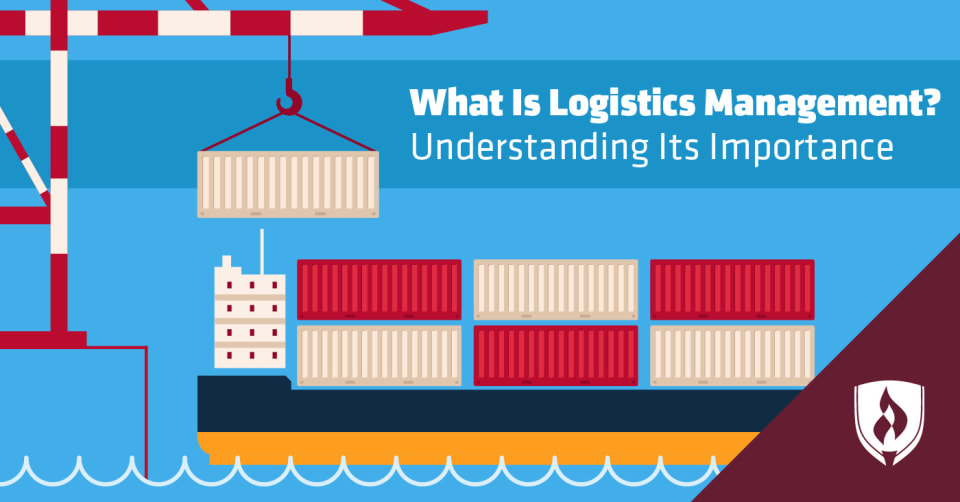
If you’re unfamiliar with the field, logistics management can seem pretty mystifying. When you start digging into this career specialization and the whole behind-the-scenes industry that comes with it, the confusion can really amplify.
But supply chain management (SCM) and logistics is also a gigantic part of life as we know it. Practically every item you see in your home has an entire supply chain leading it there—with natural resources, parts and components all being created and shipped across a complex global network. These vast interconnected streams of goods and materials are essentially the global economy’s circulatory system.
And the demand on that system is rising. “The need to have better transparency, real-time updates and better efficiency is more important than ever before in remaining competitive and meeting the demands of customers,” says Shaun Savage, CEO and founder of GoShare, a logistics and delivery company.
“Historically, the logistics industry has dragged its feet when it comes to new technology adoption,” Savage explains. “But, in recent years, that's changing. It's an exciting time to be part of the logistics community.”
Sound interesting? Read on to find out what the logistics community is like.
So, what is logistics management all about?
Supply chain logistics is about getting a product from its origin to its final destination. It may seem simple on paper—but the transfers, barriers, legal restrictions, modes of transport and more can make the logistics industry incredibly complicated.
Think of the steps you have to go through to ship a package to someone else. Even sending a simple object from point A to point B involves choosing a shipping company, packaging the object, transporting it to the shipping place and more.
Now imagine hundreds, thousands of objects, multiple points of origin, multiple destinations, international borders, trucks, freight trains and ships, items that must arrive in a small window of time and done as inexpensively as possible ... you can see how things get very complicated very fast. Professionals who work in logistics are there to keep this supply chain running smoothly, making sure all points of the transit are covered, and that everything is packaged, accounted for and delivered on time.
Contrary to what some may think—this field is by no means getting smaller with automation. “While technology is certainly advancing and becoming more of a reality in supply chain management, cutting-edge advances in supply chain robotics will augment workers—not replace them,” says Vivek Kumar, CEO of Qlicket. In fact, Kumar explains that companies today are having trouble finding qualified employees in logistics.
Part of this is because of what Kumar references as “the Amazon effect,” or a rising demand for multiple small distribution centers to meet the consumer’s desire for fast shipping. “The marriage of these two phenomena—the Amazon effect and human-robot collaboration—will lead to an increase in warehouse and distribution center employment,” Kumar says.
What does a logistics manager do?
Logistics managers plan, direct or coordinate purchasing, warehousing, distribution, forecasting, customer service or planning services, according to the U.S. Department of Labor.1 They oversee logistics employees and systems and direct daily operations.
If you work in this role, you might be called a Logistics Manager—but there are many titles that all cover similar ground. Logistics Operations Director, Logistics Solution Manager, Logistics Team Leader and Supply Chain Logistics Manager are some other common titles.
Professionals in this role will likely collaborate with other departments to integrate logistics with business systems like sales or accounting. They will supervise schedulers, create procedures for logistics activity, monitor and manage distribution center activities and resolve problems concerning transportation, imports or exports, or customer issues.
Logistics managers also need to plan for trouble. They develop risk management programs to ensure the continuity of supply in emergency scenarios—what’s the backup plan if a hurricane disrupts shipping routes or a factory is taken offline? These are the variables logistics management professionals need to anticipate.
What does it take to become a logistics manager?
If you’re thinking work in logistics sounds both fascinating and complicated—you’d be right! Work in logistics also tends to be fast-paced and stressful in crunch times, so it’s not necessarily for everyone. But for people with the right skills and traits, the field of logistics is full of both opportunity and excitement.
Logistics managers rely on a mix of soft skills and technical skills to do their jobs—plus lots of software. The Department of Labor reports the following skills as especially important in this field.
Soft skills for logistics managers:1
- Reading comprehension
- Active listening
- Coordination
- Critical thinking
- Speaking / communication
As you can see, these skills tend to revolve around communication and analytical thinking. Logistics managers have to coordinate groups of people in different places and ensure that everything connects and flows as it should.
Technology for logistics managers:
- Database management software
- Enterprise resource planning (ERP software)
- Oracle JD Edwards EnterpriseOne
- Transtek Compass ERP
- Planning logistics and supply chain software (3PL Central; Four Soft 4S VisiLog; Logisuite Enterprise)
Savage says the use of technology in logistics particularly is growing rapidly. Improved software systems can now create on-demand virtual networks of transportation professionals, improve forecasting and allow for complete supply chain visibility, he explains. “Up and coming logistics management professionals who can learn and adopt these innovations will stand out from their peers and find many strong opportunities for themselves in the field.”
For specific skill areas like these, logistics managers rely on education. But what education is needed? We analyzed over 22,000 logistics management job postings from the past year to see what employers are seeking. What we found is that over 85 percent of job postings were looking for applicants with a bachelor’s degree or higher.2 While many business-focused degrees paired with the right experience could work for meeting this requirement, there are Supply Chain and Logistics Management programs that cater to this specific subject.
What is logistics management to you?
It’s the circulatory system of our economy. It’s a crucial industry with intriguing career opportunities. It may even be your future career! If you could use a little more information about logistics careers—and want to hear from professionals in the field—you’ll want to check out our article “6 Things I Wish I Knew Before Starting a Supply Chain Management Career.”
1Bureau of Labor Statistics, U.S. Department of Labor, Occupational Employment Statistics, [accessed July 2019] www.bls.gov/oes/. Information represents national, averaged data for the occupations listed and includes workers at all levels of education and experience. Employment conditions in your area may vary.
2Burning-Glass.com (analysis of 22,061 logistics management job postings, June 1, 2018 – May 31, 2019)




